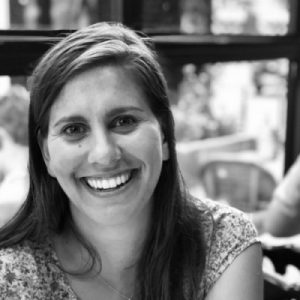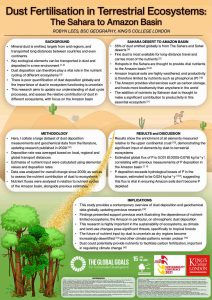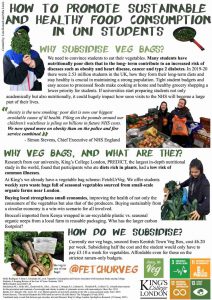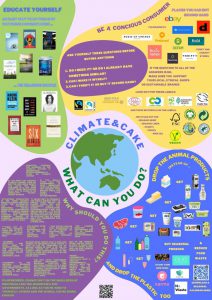This guest blog comes from Dr Nicola Harris, postdoctoral researcher in the Department of Chemistry
Lab-based research is not sustainable. If you work in a lab, think about how many tips, gloves and plastic tubes you throw away every day and then think about how many labs in the world do the same. In fact, labs are estimated to be responsible for 5.5 million tonnes of plastic waste per year. Unfortunately, alternatives to single-use plastics in the lab can be hard to come by or are labour intensive, and safety concerns mean that clinical and contaminated waste needs treating – usually by energy-intensive incineration or autoclaving (or both).
As well as the need to reduce plastic waste, CO2 emissions, electronic waste and over-consumption are also all problems with lab research. Labs use 10 times more energy than offices and 4 times more water.
We are all familiar with reduce, reuse, recycle at home – but how can we apply these in the lab? Here are some tips to help your lab move towards being more sustainable while our suppliers catch up. These tips are primarily based on my own experiences in life sciences research – I do protein-based research, with a lot of molecular biology and RNase-free work. Check out My Green Lab and LEAF for more tips!
Reduce
Probably the most important step to take right now, with the biggest impact.
New equipment – do you really need it? Can you borrow someone else’s? Does another group need something – can you share and buy it together instead of getting one each?
Reagents. If you need something, double check you don’t have it already tucked away at the back of a shelf before ordering more (a lab inventory is very useful for this). Do other groups have some you can borrow?
Consolidate autoclave runs. Does it only run when full?
Reduce lab energy consumption. Turn Ultra-Low Temperature (ULT) freezers up to -70 °C, using around 30 – 40 % less energy than -80 °C. Regular defrosts will also help freezers consume less energy. Shut fume hood sashes when not in use – a single fume hood uses the same amount of energy as a household. Turn other equipment off when not in use – most things don’t need to be on overnight and at the weekend (turning off also increases the lifetime of the equipment).
Use pipette tip refills instead of new boxes. You can autoclave refilled boxes yourself, and tip refills come in RNase-free filter tip varieties too!
Improve sterile technique. Reduce plastic waste by using a glass or metal cell spreader – these can be sterilised with ethanol and a flame and are as sterile as a plastic disposable spreader (in my opinion more sterile, as people’s hands go in and out of the packet for the disposable ones!).
Think about what you are doing and why. Protein research does not really need tips to be sterile, for example. Buffers generally don’t need to be filtered and autoclaved, and the purest water isn’t necessarily required.
Reuse
Glass alternatives. Many single-use plastics have glass alternatives that can be washed and reused. Buffers can be made in glass bottles instead of plastic tubes, and cell cultures can be grown in autoclaved glass bottles. Reusing glass many times over will result in fewer emissions, even if it needs autoclaving. Remember that disposal of contaminated plastics requires autoclaving or incineration anyway – so you might as well autoclave glassware instead.
Plastics can be washed out and reused. This may not be an attractive option, however, as it is fairly labour intensive.
Re-home old equipment. If you need new equipment, there are options to buy equipment that other labs no longer need (for example from Warp It and Richmond Scientific). Similarly, if you no longer need some equipment then it can be used in someone else’s lab.
Recycle
Unlike at home, recycling in a lab can be difficult. Waste contractors can be unhappy about taking waste that could be contaminated – but it is worth talking to them about it if you are able to.
Plastic reagent bottles. Check the resin type (1, 2 and 5 are most commonly accepted), remove the hazard label and wash out thoroughly for recycling.
Uncontaminated card and paper. The easiest thing to recycle from labs – packaging in particular.
Take-back schemes. Lots of companies do take-back schemes – for example, New England Biolabs take back their cold shipping polystyrene boxes, and Starlab take back their pipette tip boxes and tip wafers. Check with your suppliers to see if they offer any take-back schemes (or encourage them to start one!).
Ice packs. Most life sciences labs will be familiar with the huge pile of ice packs that can build up in a dusty corner of the lab. Good news – 2B Scientific recycle ice packs.
One step further
The above examples are some easy-to-follow tips – there are many more things that can be done to make your lab greener. For example, you can talk to companies about their sustainability policies, challenge them on their plastics, and feedback about their packaging. You can also liaise with your waste contractor to find out how they feel about recycling. Check My Green Lab and LEAF for bigger-scope ideas to improve your lab sustainability.
Take away messages
- It’s ok to start small
- If you are new – don’t be afraid to ask questions and make suggestions
- Go for ‘easy wins’
- Switch suppliers to support greener companies (e.g. we switched to New England Biolabs for our DNA purification kits and 2B Scientific for protein expression kits)
Don’t worry if you can’t do much – lab culture can be hard to change, and you may not have much control over how things are done in your lab. But every step helps – try something, and your example may encourage other people to take greener steps too!
A big thanks to LEAF and the King’s Chemistry sustainability team for the inspiration and ideas to make our lab greener.
Find out more about King’s Lab Sustainability Champions here.
Resources
My Green Lab https://www.mygreenlab.org/
LEAF https://www.ucl.ac.uk/sustainable/staff/labs/take-part-leaf
Richmond Scientific https://www.richmondscientific.com/
Warp It https://www.warp-it.co.uk/
Starlab https://www.starlabgroup.com/GB-en/about-starlab/sustainability.html
2B Scientific https://www.2bscientific.com/
New England Biolabs https://www.neb.uk.com/news/the-neb-shipping-box-recycling-programme
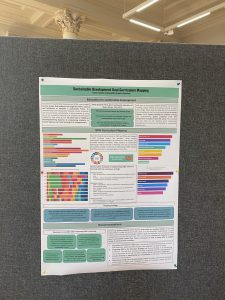 The King’s Academy Learning & Teaching Festival is an annual event which celebrates education and learning across King’s. I presented the education for sustainable development (ESD) work that the Sustainability team have been working on over this last year. This included our KEATS Sustainability & Climate module as well as our Sustainable Development Goal (SDG) Curriculum mapping. These were both 2 workshops which linked to the key themes of the festival which were sustainable education as well as co-creation with students.
The King’s Academy Learning & Teaching Festival is an annual event which celebrates education and learning across King’s. I presented the education for sustainable development (ESD) work that the Sustainability team have been working on over this last year. This included our KEATS Sustainability & Climate module as well as our Sustainable Development Goal (SDG) Curriculum mapping. These were both 2 workshops which linked to the key themes of the festival which were sustainable education as well as co-creation with students. 
